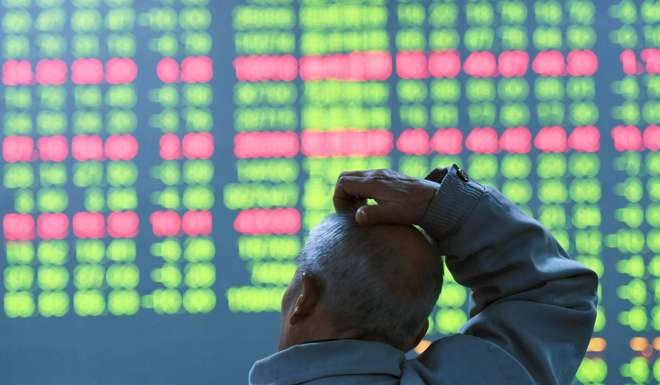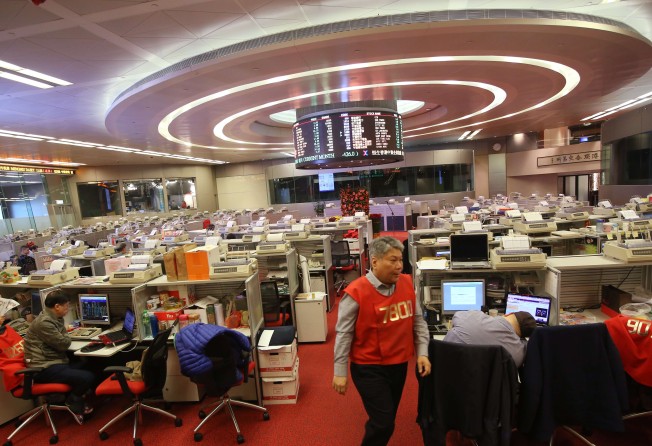
Hong Kong stocks end little changed; mainland banks advance on plan to work out bad-debt problems
The Hang Seng Index sheds 1.38 points to 22,676.69

Hong Kong’s main share index ended little changed on Wednesday, while H-shares outperformed, with mainland banks among the leaders following media reports that they will set up subsidiaries geared toward swapping debt for equity, a move seen as helping to resolve the mounting bad debt problem among lenders.
The Hang Seng Index ended down 0.01 per cent or 1.38 points at 22,676.69, while Hang Seng China Enterprise Index gained 0.15 per cent to 9,665.99.
China Construction Bank (CCB) was the best performer among the 50 blue chips, with its shares closing 1.42 per cent higher at HK$5.70. Bank of China (BOC) gained 0.87 per cent to HK$3.46 and Industrial and Commercial Bank of China (ICBC) rose 0.87 per cent to HK$4.64.
Agricultural Bank of China (ABC) gained 0.94 per cent to HK$3.22, after announcing late on Tuesday that it is setting up a wholly-owned subsidiary with 10 billion yuan (HK$11.2 billion) of registered capital to conduct debt to equity swaps. Mainland media Caixin reported that China’s big state-owned banks, including ICBC, CCB, ABC, BOC and Bank of Communications all plan to set up similar subsidiaries with about the same initial capital size.
“Investors were certainly buying on the news, as they believe debt-to-equity swaps can solve the bad-debt problem of mainland banks,” Castor Pang Wai-sun, head of research at Core Pacific Yamaichi said.

But he was still concerned that the swap may worsen the cash position of banks as their capital would be locked up in the form of equity in other companies, Pang said.
The banking rally was offset by a sell-off in Tencent Holdings, HSBC Holdings and China Life Insurance.
Tencent lost 0.77 per cent to HK$194.3 while HSBC fell 0.41 per cent to HK$61.45.
Mark To, head of research at Wing Fung Financial Group, said Hong Kong, along with other emerging markets, is suffering capital outflows ahead of an expected interest rate increase in the United States.
Among movers, The Hongkong and Shanghai Hotels, owner of the Peninsula hotel chain, jumped 15.12 per cent to end at HK$9.29, amid frenzied trade in the pre-market session. Daily turnover in the share reached HK$704 million, the highest in over 12 years.
Mainland developer China Vanke Co saw its shares move up 5.41 per cent to HK$23.4, the strongest level since listing in June 2014, after it disclosed that its property giant and rival Evergrande now owns 10 per cent of its total share capital.
Ba Shusong, chief China economist at Hong Kong Exchanges & Clearing, said that the technical preparation for the Shenzhen-Hong Kong Stock Connect has been done, pending regulators’ approval for launch.
The launch date for the cross border trading scheme will be announced two weeks in advance, as regulators seek to delay the debut beyond the last week in November when Hong Kong index compilers review and adjust the constituent stocks.
The scheme is likely to be launched on a Monday, Ba said at an event in Shanghai, and regulators will consider the fact that global asset managers will have Christmas holidays in late December.
In other trading, the Shanghai Composite Index fell 0.22 per cent to close at 3,241.14, while Shenzhen Component Index fell 0.11 per cent to 10,973.8. The Nasdaq-style ChiNext lost 0.55 per cent to 2,165.71. The CSI 300 Index, which tracks big companies in Shanghai and Shenzhen, ended 0.18 per cent higher at 3,474.73.